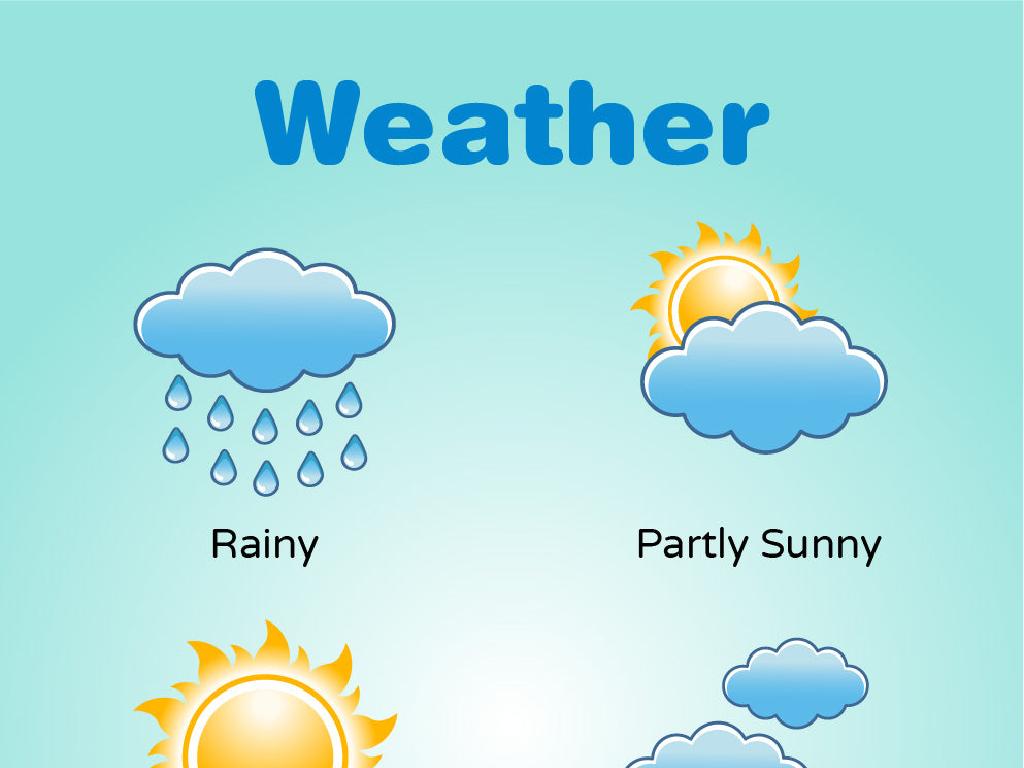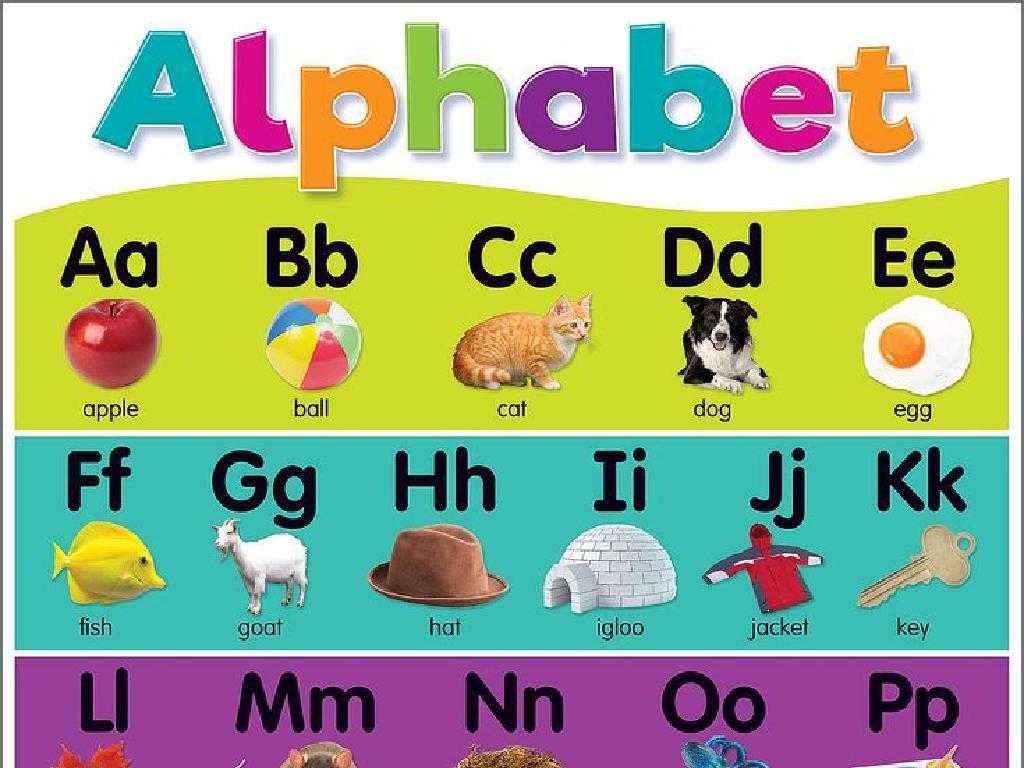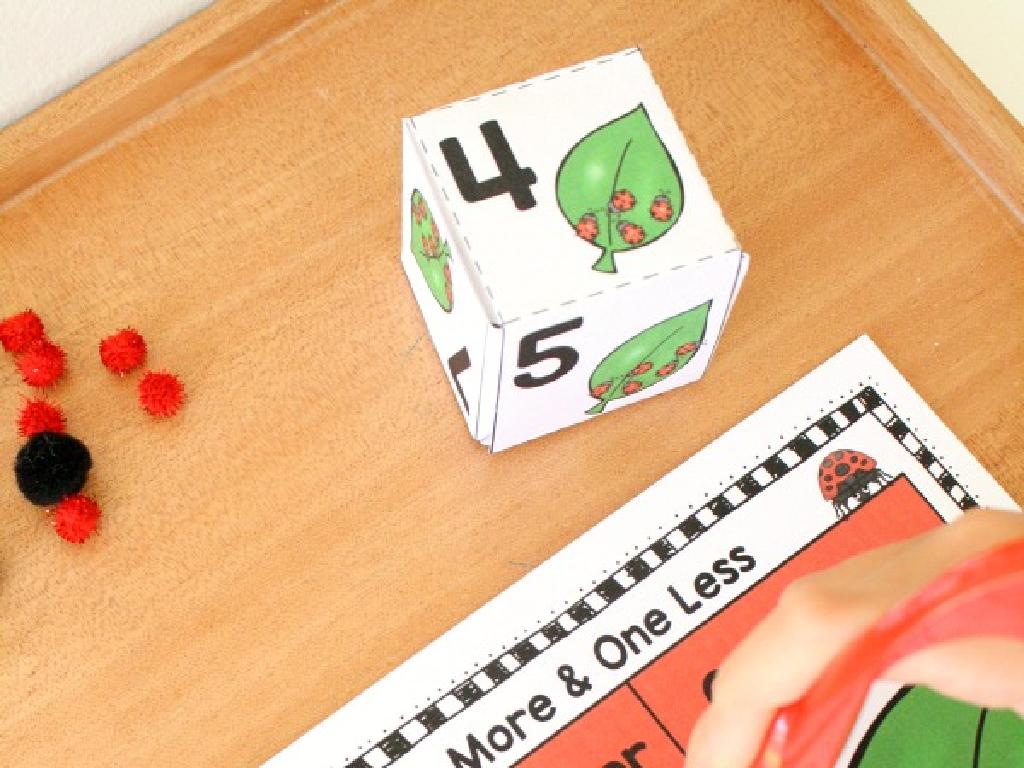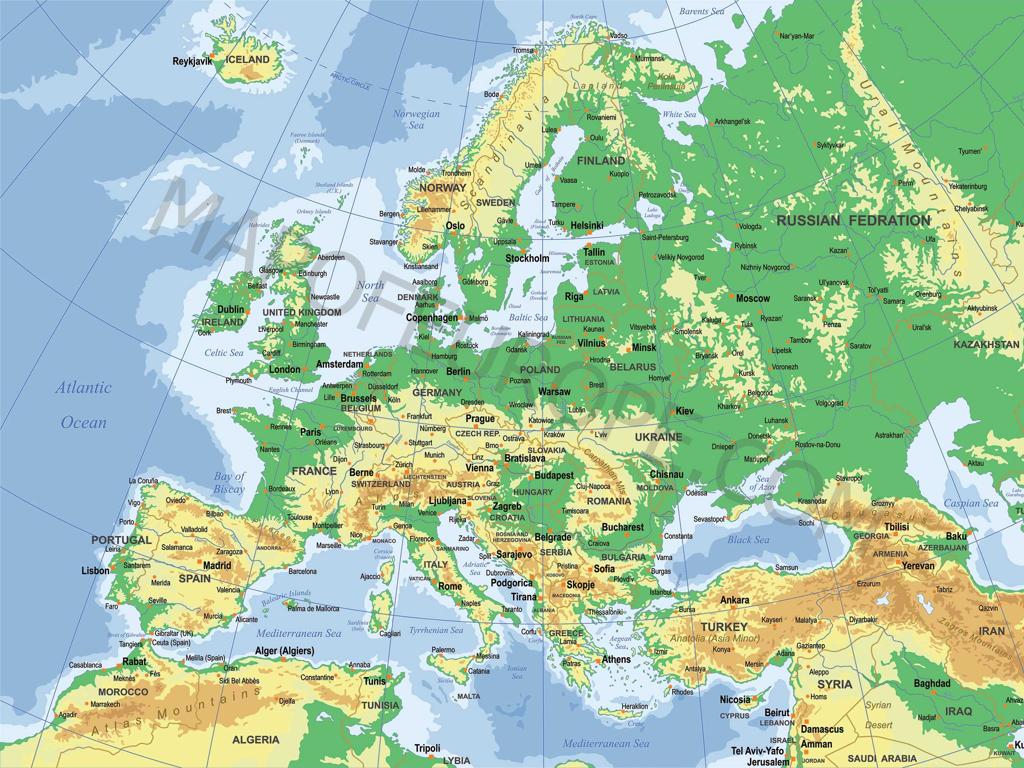Who, What, When, Where, Or Why?
Subject: Language arts
Grade: Kindergarten
Topic: Question Words
Please LOG IN to download the presentation. Access is available to registered users only.
View More Content
Welcome to Question Words!
– Greeting with a warm smile
– Today’s topic: Who, What, When, Where, Why
– Question words help us ask about our world
– These words start questions to learn more about someone or something
– We’ll learn how to use them
– Examples: ‘Who is your teacher?’, ‘What is your favorite color?’
|
Begin the class with a friendly greeting to create a welcoming atmosphere. Introduce the topic of question words, emphasizing their importance in everyday communication. Explain that ‘Who’ is for asking about people, ‘What’ for things or activities, ‘When’ for time, ‘Where’ for places, and ‘Why’ for reasons. Use simple and relatable examples to illustrate each question word. Encourage the children to think of questions they would like to ask using these words. The goal is to make them comfortable with asking questions and curious about the answers they can discover.
Understanding Questions
– What is a question?
– It’s when you ask someone to tell you something.
– Examples: Questions vs. Non-questions
– ‘What is your name?’ vs. ‘Your name is Sam.’
– Questions help us learn
– Asking questions is how we find out new things!
– Always okay to ask questions
– If you re curious, just ask your teacher or friends!
|
This slide introduces the concept of a question to Kindergarten students. Start by defining a question as a way to ask for information. Show clear examples of what is a question and what is not, such as ‘What is your name?’ versus ‘Your name is Sam.’ Emphasize that asking questions is a good thing and it’s how we learn about the world around us. Encourage the students to be curious and reassure them that it’s always okay to ask questions. Use a friendly and engaging tone to make the children feel comfortable with asking questions in class.
Meet the Question Words
– ‘Who’ asks about people
– Like ‘Who is your friend?’
– ‘What’ asks about things
– Like ‘What is in your hand?’
– ‘When’ asks about time
– Like ‘When is lunchtime?’
– ‘Where’ asks about places
– Like ‘Where is the toy?’
– ‘Why’ asks for reasons
– Like ‘Why are you happy?’
|
This slide introduces the basic question words to Kindergarten students, helping them understand how to gather information about people, things, time, places, and reasons. Use examples that are relevant to their daily lives to make the concepts relatable. Encourage the students to think of their own questions using these words and practice them in class. This will help them become familiar with the structure of questions and the type of answers they can expect. Reinforce learning with activities where they match questions to pictures or scenarios.
Asking Questions with ‘Who’
– Examples of ‘Who’ questions
– ‘Who is your best friend?’ ‘Who teaches us?’
– Practice ‘Who’ questions aloud
– Let’s say together: ‘Who has a red ball?’
– Create your own ‘Who’ questions
– Think of a question about your family or friends.
|
This slide is aimed at teaching Kindergarten students how to use the question word ‘Who’ to ask about people. Start by providing examples of ‘Who’ questions that are relevant to their daily lives, such as asking about friends and teachers. Then, practice saying ‘Who’ questions as a class to reinforce pronunciation and understanding. Finally, encourage students to come up with their own ‘Who’ questions, which can be about their family members, friends, or characters from a story. This activity will help them understand the concept of inquiring about people’s identity or roles and will enhance their curiosity and engagement with the language.
Asking Questions with ‘What’
– Examples of ‘What’ questions
– ‘What is your name?’ or ‘What color is the sky?’
– Practice ‘What’ questions aloud
– Repeat after me: ‘What is your favorite toy?’
– Create your own ‘What’ questions
– Think of a question about your favorite food.
|
This slide is aimed at teaching Kindergarten students how to use the question word ‘What’ to ask about objects, people, and the world around them. Start by providing clear examples of ‘What’ questions that are relevant to their daily lives. Engage the class by practicing these questions together, ensuring they feel comfortable with the pronunciation and structure. Then, encourage creativity by asking them to come up with their own ‘What’ questions, which can be about their favorite toys, animals, or any topic of interest. This activity will help them understand the use of ‘What’ in forming questions and enhance their curiosity and inquiry skills.
Asking Questions with ‘When’
– What does ‘When’ ask about?
– ‘When’ is for asking about time
– Examples of ‘When’ questions
– ‘When is your birthday?’ or ‘When do we eat lunch?’
– Practice ‘When’ questions aloud
– Create your own ‘When’ questions
|
This slide is aimed at teaching Kindergarten students how to use the question word ‘When’ to inquire about time-related information. Start by explaining that ‘When’ is used to ask about specific times, such as days, dates, and parts of the day. Provide clear examples that they can relate to, like questions about daily routines or special events. Engage the class by practicing these questions together, emphasizing pronunciation and encouraging them to listen to the answers. Finally, prompt the students to think creatively and come up with their own ‘When’ questions, which helps them apply their understanding in a personal context. This activity fosters curiosity and helps them grasp the concept of time in a fun and interactive way.
Asking Questions with ‘Where’
– Examples of ‘Where’ questions
– ‘Where is my teddy bear?’ or ‘Where do birds fly?’
– Practice ‘Where’ questions aloud
– Let’s say together: ‘Where is the playground?’
– Create your own ‘Where’ questions
– Think of a question about your favorite place!
– Share your ‘Where’ questions
– Tell the class your question and we’ll guess the answer!
|
This slide is aimed at teaching Kindergarten students the concept of ‘Where’ questions. Start by providing examples of ‘Where’ questions that are relevant to their daily lives, such as finding a toy or talking about animals. Then, practice saying ‘Where’ questions as a class to reinforce pronunciation and understanding. Encourage students to come up with their own ‘Where’ questions, perhaps relating to their favorite places or objects. Finally, have a sharing session where students can share their questions with the class, and the class can engage in trying to answer them. This activity will help students understand the use of ‘Where’ in forming questions and how it relates to locations and places.
Asking Questions with ‘Why’
– Understanding ‘Why’ in questions
– Examples of ‘Why’ questions
– ‘Why do we eat food?’, ‘Why is the sky blue?’
– Practice ‘Why’ questions aloud
– Practice with the class: ‘Why do we wear coats?’
– Create your own ‘Why’ questions
– Think of a ‘Why’ question about your favorite animal
|
This slide is aimed at helping Kindergarten students understand the use of the question word ‘Why’ to learn about reasons and explanations. Start by explaining that ‘Why’ asks for reasons behind actions or facts. Provide clear examples that are relevant to their experiences. Engage the class by practicing some ‘Why’ questions together, ensuring to articulate the word ‘Why’ clearly. Then, encourage creativity by asking students to come up with their own ‘Why’ questions, possibly about things they are curious about, like animals, nature, or daily routines. This activity will help them understand the concept of inquiry and reason, which are fundamental to critical thinking and language development.
Let’s Play a Question Game!
– Learn the game rules
– Split into small teams
– Ask and answer with question words
– Use ‘who’, ‘what’, ‘when’, ‘where’, ‘why’ to ask each other questions
– Have fun discovering answers!
|
This interactive game is designed to help Kindergarten students practice using question words in a fun and engaging way. Start by explaining the rules: each group will take turns asking a member of another group a question using one of the question words. Then, divide the class into small groups of 3-4 students to facilitate easier participation. Encourage the children to think of creative questions and answers. Possible activities include ‘Who is your favorite cartoon character?’, ‘What is your favorite toy?’, ‘When do you eat dinner?’, ‘Where is your favorite place in school?’, ‘Why do you like recess?’. This game will help students understand the use of question words in everyday language and enhance their speaking and listening skills.
Class Activity: Question Word Hunt
– Find objects in our classroom
– Ask and answer with question words
– Use ‘Who’, ‘What’, ‘When’, ‘Where’, ‘Why’ to make questions
– Work together with classmates
– Help each other with questions
|
This activity is designed to help Kindergarten students practice using question words in a fun and interactive way. Set up a ‘Question Word Hunt’ where students search for objects around the classroom. As they find an object, they should think of a question about it using one of the question words. Encourage them to ask their question to a classmate and answer any questions they are asked in return. This will help them understand how to use ‘Who’, ‘What’, ‘When’, ‘Where’, and ‘Why’ to gather information. For example, they might find a clock and ask, ‘What time is it?’ or see a plant and wonder, ‘Who planted this?’ Facilitate the activity by walking around the classroom, assisting students in forming questions and answers. Praise cooperative behavior and the use of question words. After the activity, regroup and discuss what everyone has learned.
Review and Goodbye!
– Recap question words
– Who, what, when, where, why help us learn about the world.
– Share your learnings
– Who wants to tell us what they discovered today?
– Cheerful class farewell
– Keep being curious!
– Asking questions is a superpower!
|
As we wrap up today’s class, let’s go over the question words we’ve learned: who, what, when, where, and why. These words help us understand the world around us better. Encourage the children to volunteer and share something they learned using these question words. It’s important to create a positive and supportive environment for the students to express themselves. End the class on a high note, reminding the kids that asking questions is important and that they should always stay curious. Give them a cheerful goodbye and let them know you’re looking forward to seeing them next time.






